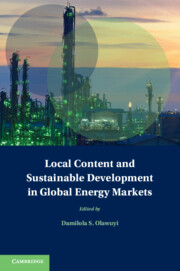Book contents
- Local Content and Sustainable Development in Global Energy Markets
- Reviews
- Treaty Implementation for Sustainable Development
- Local Content and Sustainable Development in Global Energy Markets
- Copyright page
- Contents
- Preface and Acknowledgements
- Abbreviations
- Editor
- Contributors
- Part I Introductory Context and Principles
- Part II Case Studies
- 6 Expressing Local Content through Black Economic Empowerment in the South African Petroleum Industry
- 7 Local Content Frameworks for Petroleum Industry Operations in the CEMAC Region: An Evaluation of Their Functionality, Sustainability and Normative Underpinnings
- 8 Local Content, Angolanização, and Sustainable Development in Angola
- 9 Local Content and the Sustainable Development of Oil and Gas Resources in Nigeria
- 10 Local Content Requirements and Treaty Implementation in Kenya’s Petroleum Sector
- 11 Sustainability and Local Content Requirements in Australian Oil and Gas Development: Has the Ship of Opportunity Sailed?
- 12 Local Content for Sustainable Development in Middle East and North Africa: Current Legal Approaches and Future Directions
- 13 Local Content and Sustainable Development in Norway
- 14 Local Content and Sustainable Development in Argentina
- 15 The Latin American Experience in Designing Local Content Policies in the Oil and Gas Sectors: Strengths, Limitations, and Future Perspectives
- 16 Local Content and Sustainable Development in Brazil
- 17 Industrial Policy and Local Content Rules in US Energy Policy
- 18 Oil and Gas Sector Local Content Decision Processes: Canadian Indigenous Participation
- Part III Lessons Learned and Future Directions
- Index
6 - Expressing Local Content through Black Economic Empowerment in the South African Petroleum Industry
from Part II - Case Studies
Published online by Cambridge University Press: 05 March 2021
- Local Content and Sustainable Development in Global Energy Markets
- Reviews
- Treaty Implementation for Sustainable Development
- Local Content and Sustainable Development in Global Energy Markets
- Copyright page
- Contents
- Preface and Acknowledgements
- Abbreviations
- Editor
- Contributors
- Part I Introductory Context and Principles
- Part II Case Studies
- 6 Expressing Local Content through Black Economic Empowerment in the South African Petroleum Industry
- 7 Local Content Frameworks for Petroleum Industry Operations in the CEMAC Region: An Evaluation of Their Functionality, Sustainability and Normative Underpinnings
- 8 Local Content, Angolanização, and Sustainable Development in Angola
- 9 Local Content and the Sustainable Development of Oil and Gas Resources in Nigeria
- 10 Local Content Requirements and Treaty Implementation in Kenya’s Petroleum Sector
- 11 Sustainability and Local Content Requirements in Australian Oil and Gas Development: Has the Ship of Opportunity Sailed?
- 12 Local Content for Sustainable Development in Middle East and North Africa: Current Legal Approaches and Future Directions
- 13 Local Content and Sustainable Development in Norway
- 14 Local Content and Sustainable Development in Argentina
- 15 The Latin American Experience in Designing Local Content Policies in the Oil and Gas Sectors: Strengths, Limitations, and Future Perspectives
- 16 Local Content and Sustainable Development in Brazil
- 17 Industrial Policy and Local Content Rules in US Energy Policy
- 18 Oil and Gas Sector Local Content Decision Processes: Canadian Indigenous Participation
- Part III Lessons Learned and Future Directions
- Index
Summary
South Africa’s path to strengthening its industrial base and promoting the development of new industries - what would typically be the objectives of a local content policy - is implemented by and large through its policy of Black Economic Empowerment. This represents a particular species of local content requirements: one that focuses not only on enabling local participation for the benefit of extractive activity, but also specifically on providing benefit to particular, identified groups, the HDSAs.
The South African Constitution of 1996 mandates the state to achieve Black Economic Empowerment, to address the country’s historically skewed socio-economic structure, a consequence of past injustices and discrimination. In the country’s extractives industries such empowerment programmes embody the local content requirements, which are linked to the government’s goals of promote transformation through legislative and other measures.
The petroleum industry has seen the proliferation of both industry-specific and generic laws in the wake of the 1996 Constitution. It contributed to creating a framework for empowerment of especially for Historically Disadvantaged South Africans (HDSAs). This chapter focuses on the relationship between Black Economic Empowerment (BEE) and local content requirements, specifically local ownership or holding in the petroleum industry in South Africa. It explains the genesis of South Africa’s skewed social structure and the need for socio-economic transformation. The main argument is that the policy of Black Economic Empowerment has influenced the understandings of what it means to promote local content. The chapteris critical of the ability of policy statements, such as that comprised in the Petroleum Charter, to effect meaningful changes where implementation is weak. It focuses largely on the black ownership provisions, and how this is dealt with under the BEE process. The chapter criticises the unduly heavy reliance on transformation of ownership patterns to address the socio-economic challenges referred to as the ‘evil triplets’ of poverty, unemployment, and inequality.
- Type
- Chapter
- Information
- Publisher: Cambridge University PressPrint publication year: 2021

